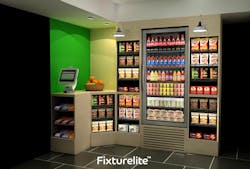Will Micro Markets Replace Pantry Service?
It is easy to hope that once the pandemic is over and the workplace returns to “normal,” that things will go right back to where there were in late January. Clients were energized, workplaces were in high gear and pantry service locations were rightfully at the top of the heap, the “golden goose” locations of convenience services.
Here is the reality: Because we are now in a recession, only clients with the deepest pockets and an unwavering commitment to spoiling their employees will keep their pantry service program in place. The rest will need an alternative and if your sales team is prepared to pivot, they will be positioned to keep those accounts out of your competitor’s reach. A subsidized micro market is the solution and smart operators should be pitching the idea to their clients right now.
Does this change to a subsidized market represent a big loss for operators? Not necessarily.
The truth about pantry service
Let’s be honest about the pantry service business for a minute. Even before COVID-19, the pantry service business, while successful in select areas of the country, was undergoing a slow but steady decline. Not a decline in the number of pantry services, or a decline in product consumption, but a decline in profitability for operators. We saw the decline starting four years ago, driven by four primary factors.
1. A constant squeeze on margins brought on by clients who were spending far too much (in the eyes of their CFO at least). Some of the profit margins on national deals we looked at were downright ridiculous. Volume only goes so far.
2. Cutbacks on product. There is a misconception that decreasing the variety will decrease consumption. When a client cuts the snack selection by 20%, it has a very small impact on sales, but typically, the free pantry service product that is still available increases in usage to make up for it. At the same time, the products that the office manager cuts out start appearing in the kitchen anyway, paid for from a different office budget, just not purchased from the operator.
3. Sharing the shelf space with online suppliers. Unless an operator is ready to lay down the gauntlet on “exclusive rights,” customers are increasingly buying from outside sources, which definitely erodes sales for the operator. Online ordering will be more prevalent than ever in the post Covid-19 office and if you are still in the pantry business, you will be sharing more shelf space than ever. Packaged items, often cheaper online, will be in demand as some clients reject bulk snacks.
4. Increased cost of service. High profile, big spending pantry accounts, even if the margins aren’t great, demand the highest level of service. That combination — daily service requirements and low margins — are punishing to an operator.
In a recession, these challenges are only going to be amplified. Facility Managers will be under pressure to cut costs and your pantry service accounts will be a prime target.
Instead of pretending that everything will be just like it was in February, only to get blindsided by a client voicing concerns about pricing, cutting back on product, ordering from online suppliers and still demanding the same level of service – here’s the opportunity: Take a proactive approach and introduce your pantry service clients to the concept of a subsidized micro market.
History repeats itself
After the dot-com implosion around the turn of the century, the new tech stars that survived (mainly because they were real companies) often replaced their pantry service with subsidized vending. They saved significant dollars. Seriously, what employee could complain about paying 25 cents for a beverage or snack in the name of retaining jobs?
This time, the subsidized micro market will be a blessing to operators and a solution for cash strapped companies.
Micro Market Design is a key selling point
“Now is the time to move clients from pantry service to subsidized markets,” said Steve Orlando, an experienced operator of ten years who co-founded Fixturelite, the leading supplier of micro market retail displays, seating and design features. “Once it starts happening, the snowball will gain momentum.”
Orlando says the key to converting pantry service accounts to subsidized micro markets is to focus on design elements – on what the client and their employees are gaining, not what they are giving up. “Clients will save 50 to 70 percent by switching from a pantry service to a subsidized micro market. With that in mind,” added Orlando, “Operators should ask for a portion of that savings to help design a truly exceptional workplace refreshment area. We can earn client financial support by designing a refreshment area that is not only attractive, but also a place to relax, collaborate and refuel.”
Increased safety through micro market technology
According to Orlando, a thoughtful design can also meet the specific physical distancing requirements at a company. “We can ease many concerns by using heat mapping technology to understand traffic flow,” he said. “Kiosk free micro markets are an added plus for operators and clients. Phone apps mean lower operating costs for operators and a touch free payment solution, which will be a high priority for many clients.”
“As operators, we are much better off delivering a subsidized micro market that will please our clients and their employees, rather than dealing with the constant price squeezing and product reductions that occur when a client is feeling the pressure to cut pantry service costs,” said Orlando. “The economic slowdown that was expected by many, arrived in a different fashion that anyone expected. Micro market operators are in a strong position to turn this into a positive and capitalize on the opportunity.”
Industry consultant Bob Tullio (www.tullioB2B.com) is a content specialist who advises operators in the convenience services industry on how to build a successful business from the ground up. As he is a recognized industry expert in business development and sales, NAMA hired him to write and narrate the new online course, “Selling Convenience Services,” which is now available. Use discount code B2B10 for an instant discount and for free access to upcoming Q & A Webinars from Tullio in the coming months. Here is a free sample of the course.

Bob Tullio
Bob Tullio is a content specialist, speaker, sales trainer, consultant and contributing editor of Automatic Merchandiser and VendingMarketWatch.com. He advises entrepreneurs on how to build a successful business from the ground up. He specializes in helping suppliers connect with operators in the convenience services industry — coffee service, vending, micro markets and pantry service specifically. He can be reached at 818-261-1758 and [email protected]. Tullio welcomes your feedback.
Subscribe to Automatic Merchandiser’s new podcast, Vending & OCS Nation, which Tullio hosts. Each episode is designed to make your business more profitable.






